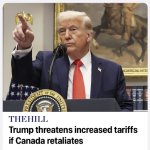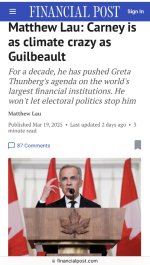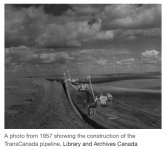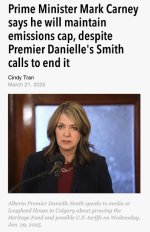Alberta Premier Danielle Smith says U.S. tariffs are "an unjustifiable economic attack on Canadians and Albertans" that represent a clear breach of the Canada-U.S.-Mexico free trade agreement.As I said before, she knows no tariffs are coming and kept her word on staying quiet. She spent two days at Mar-a-Lago. 40+ hours more than any other Canadian politician.
Get some boxers, panties seem to bunch up on you.
"These tariffs will hurt the American people, driving up costs for fuel, food, vehicles, housing and many other products," Smith said in a statement Tuesday.
"They will also cost hundreds of thousands of American and Canadian jobs. This policy is both foolish and a failure in every regard."
U.S. tariffs came into effect Tuesday morning — 25 per cent on most Canadian goods, but 10 per cent on oil and gas products.
Prime Minister Justin Trudeau immediately announced retaliatory tariffs on $30 billion worth of American goods.

In her statement, Smith said Alberta "fully supports the federal response." She said she will meet with her cabinet Tuesday and Wednesday to discuss Alberta's response. Details will be announced Wednesday, she said.
Earlier Tuesday, Smith was interviewed on CNBC about the tariffs.
"To see this escalation is so disappointing, so damaging initially to American consumers and American businesses who buy Canadian goods and raw materials," Smith told the U.S. cable news channel.
Americans and Canadians alike will feel the effects of the tariffs, Smith said.
"No one wins a tariff war," she said.
"I don't know why the president is behaving this way because it's illegal. We're going to challenge it and we would like to get back to negotiating some of the pressure points on that."
'No choice' but to react to U.S. tariffs, Alberta premier says in supporting federal response — CBC News
Alberta Premier Danielle Smith said Tuesday she’s disappointed with U.S. President Donald Trump’s move to impose 25 per cent tariffs on Canadian goods, 10 per cent on oil and gas products.
"We don't want to get there," she said on CNBC. "I mean, we don't want to escalate, we don't want to retaliate, but we have no choice but to have an equal and proportionate response."
She said Americans need to understand that Canada is its best customer. "We buy more goods and services from you than anyone else in the world."
The tariffs means Canadians will just start buying less from the U.S., she said.
"It doesn't make sense to treat your biggest customer this way."





